In 2025, AI tools have reshaped marketing strategies, offering unprecedented capabilities in data analysis, customer insights, and automation.
From AI-driven chatbots enhancing customer interactions to predictive analytics refining campaign effectiveness, these tools are essential for modern marketing teams.
Here's a concise guide to the top 25 AI tools for marketing your team should be leveraging to stay ahead in today's digital landscape.
What Is An AI Marketing Tool?
An AI marketing tool is a software application or platform that utilizes artificial intelligence (AI) technologies to enhance various aspects of marketing activities. These tools typically leverage machine learning algorithms, natural language processing (NLP), and predictive analytics to automate tasks, improve decision-making, and optimize marketing campaigns.

What are the Benefits of Using AI Marketing Tools?
Using AI marketing tools offers several key benefits that can significantly enhance marketing efforts:
- Improved Insights: Provides deep, real-time customer data for better decision-making.
- Automation: Automate tasks like email campaigns and customer service, saving time.
- Optimized Campaigns: Adjust strategies in real-time for maximum ROI and efficiency.
- Predictive Analytics: Forecasts trends to stay ahead of the competition.
- Cost Efficiency: Reduces operational costs by automating processes.
- Scalability: Handles large volumes of data and tasks effectively for businesses of any size.
- Competitive Edge: Drives growth and enhances customer satisfaction with advanced capabilities.
Top 25 AI Tools for Marketing (By Category)

A) AI Marketing Tools for Productivity
1. Kroolo

Kroolo is an advanced AI-driven project management software designed to empower teams with streamlined workflows, enhanced collaboration, and intelligent automation. Whether you're a startup, a growing business, or an enterprise, Kroolo offers robust tools to manage projects efficiently from inception to completion.
Key Features
- Generate Projects Using Text or Voice Prompts: Kroolo simplifies project creation by allowing users to generate projects instantly using text or voice prompts.
- Chat with Project (Discuss Anything): Collaborate seamlessly with team members and stakeholders by chatting directly within project boards. Discuss project details, share updates, and brainstorm ideas in real time.
- Chat with PDF: Leverage chat with PDF to extract summaries, uncover actionable insights, or pose questions directly to your project data.
- Suggest Tasks or Subtasks Instantly: Kroolo analyzes project data to recommend tasks based on priorities, dependencies, and timelines, optimizing productivity and task management.
- Create Goals and OKRs in 5 Seconds: Set clear objectives and key results (OKRs) effortlessly using text or voice prompts.
- Chat with Doc: Instantly create and collaborate on documents or wikis using text or voice prompts.
- Custom AI Agents: Tailor Kroolo's AI capabilities to meet specific business needs by creating and managing custom AI agents.
2. Monday.com
 via Monday.com
via Monday.com
Monday.com is known for its highly customizable workflows that cater to various project management needs. It features AI-powered automation for task assignments, deadline reminders, and progress tracking.
- Pros:
- Customizable workflows that cater to various project management needs.
- AI-powered automation for task assignments, deadline reminders, and progress tracking.
- Visual project tracking with Gantt charts and Kanban boards.
- Cons:
- Costlier than some competitors, especially for larger teams or advanced features.
- Requires time for initial setup and configuration to maximize efficiency.
3. Asana

via Asana
Asana provides AI-driven task management with intelligent recommendations and workload balancing. It integrates seamlessly with a wide range of third-party apps and services, offering real-time collaboration and project tracking.
- Pros:
- AI-driven task management with intelligent recommendations and workload balancing.
- Integration with a wide range of third-party apps and services.
- Real-time collaboration and project tracking features.
- Cons:
- Complex setup and configuration for larger projects or diverse workflows.
- Advanced features like automation rules may require higher-tier subscriptions.
4. Trello
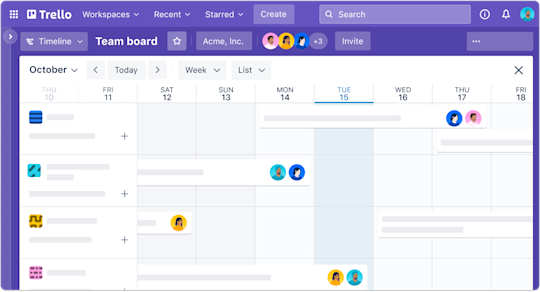
via Trello
Trello is celebrated for its simplicity and user-friendly interface, making it ideal for agile project management. It utilizes AI-driven automation through Butler for tasks like assignments and notifications, and offers extensive customization with power-ups and integrations.
- Pros:
- Simple and user-friendly interface suitable for agile project management.
- AI-driven automation through Butler for task assignments and notifications.
- Extensive customization with power-ups and integrations.
- Cons:
- Limited in-depth project management capabilities compared to more robust tools.
- May become cluttered with extensive use of power-ups and integrations.
5. Wrike

Wrike offers AI-powered project planning and resource management capabilities designed to optimize workflows. It provides real-time analytics and reporting for informed decision-making, making it scalable for teams of all sizes.
- Pros:
- AI-powered project planning and resource management for efficient workflows.
- Real-time analytics and reporting for better decision-making.
- Scalable platform suitable for teams of all sizes, from startups to enterprises.
- Cons:
- Higher learning curve for new users, especially those unfamiliar with project management software.
- Pricing structure may be prohibitive for smaller teams or startups.
B) AI Marketing Tools for Digital Marketing
6. Seventh Sense

via seventh sense
Seventh Sense leverages behavior profiling to optimize email campaigns, predicting the ideal send times tailored to each contact’s activity. Integrated with HubSpot and Marketo, it enhances email deliverability and sender reputation with flexible pricing options.
Pros:
- Personalized email scheduling improves engagement.
- Seamless integration with major marketing platforms.
Cons:
- Pricing tied to HubSpot and Marketo subscriptions.
- Costs may vary based on usage and features.
7. Chatfuel
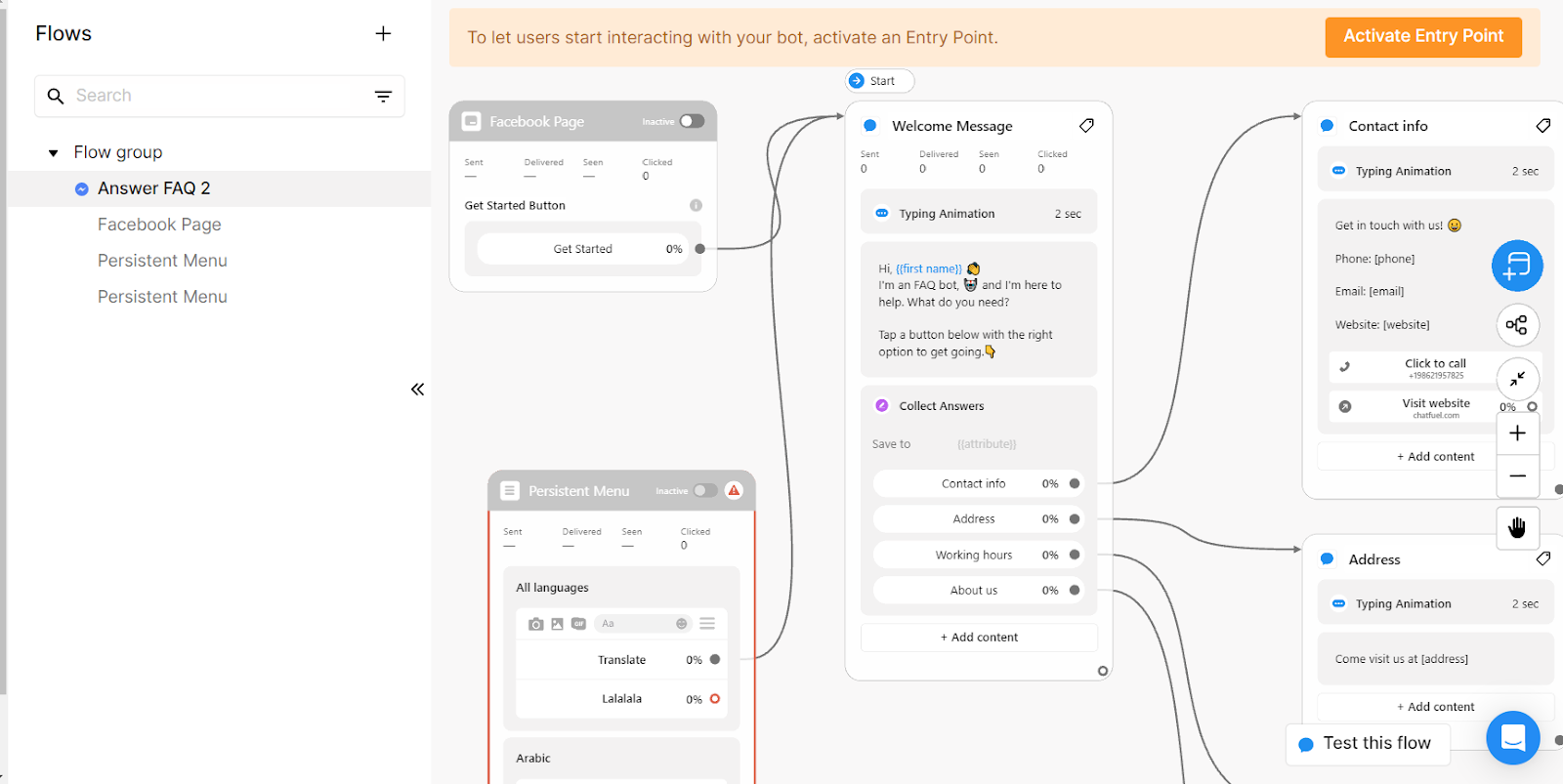
vua Chatfuel
Chatfuel is a leading AI-powered chatbot platform for Facebook Messenger, facilitating easy bot creation without coding. It offers customizable templates, natural language processing, and robust analytics for optimizing customer interactions.
Pros:
- Intuitive interface for non-technical users.
- Powerful automation capabilities and detailed analytics.
Cons:
- Limited free plan features.
- Higher pricing tiers for advanced functionalities.
8. Optimove
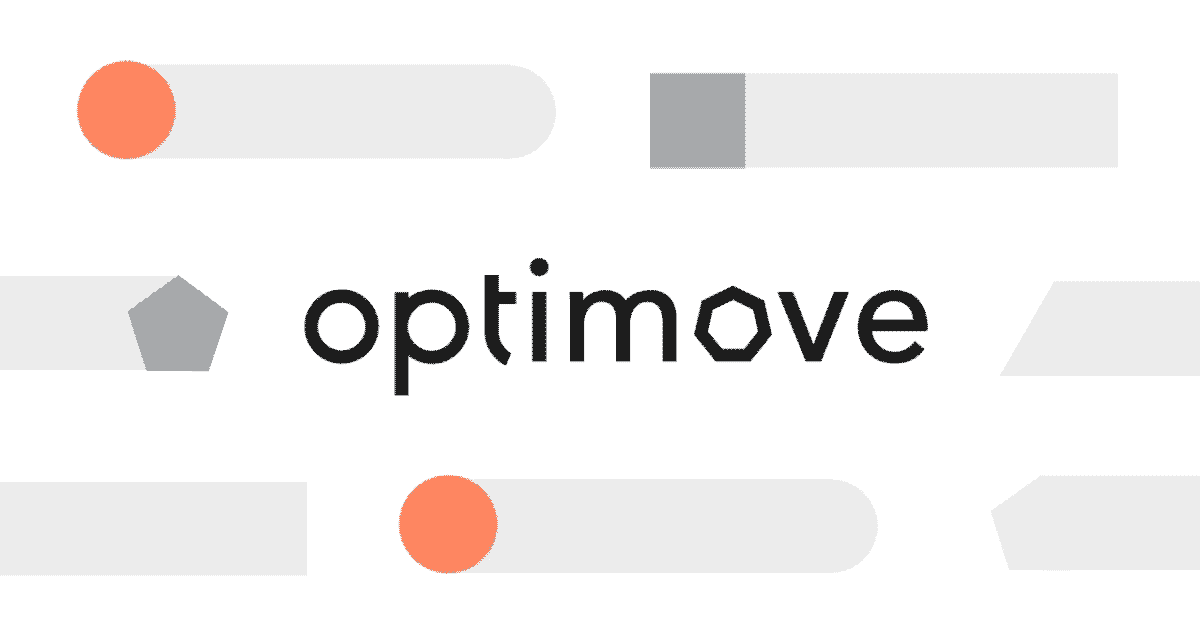
via Optimove
Optimove is a customer data platform offering a unified view of customer behavior and insights, campaign performance, hyper-segmentation, A/B testing, and multi-channel tracking for effective marketing strategies.
Pros:
- Advanced customer segmentation for precise targeting.
- Comprehensive insights into campaign performance.
- Multi-channel tracking enhances marketing effectiveness.
Cons:
- Custom pricing can be expensive for small businesses.
- Complexity may require dedicated training or support
9. Tidio
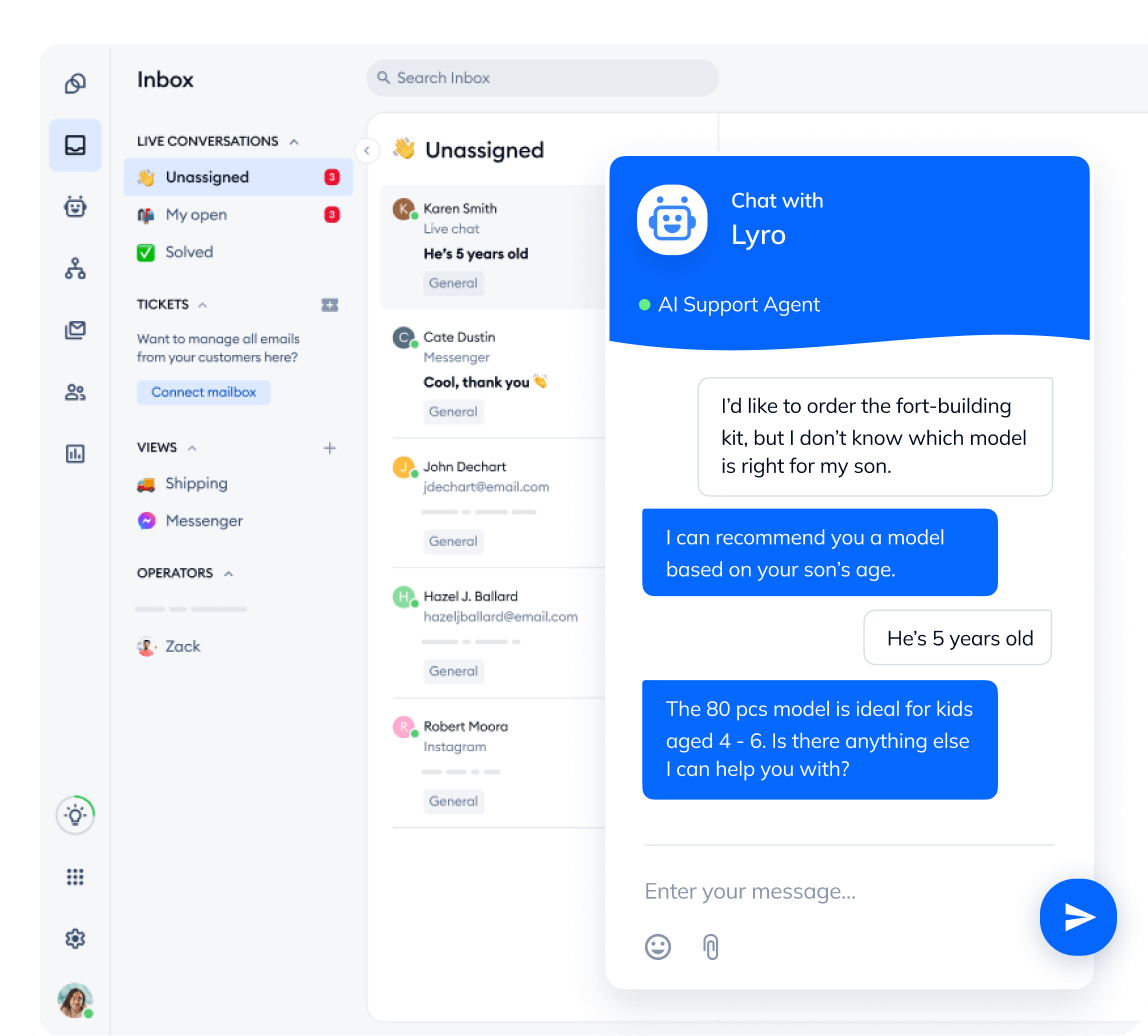
via Tidio
Tidio is an AI-powered chatbot platform focusing on website conversion optimization through live chat and customer interaction management.
Pros:
- Improves web conversions and lead generation.
- Enhances customer engagement with live chat support.
- Helps in reducing churn rates and building customer loyalty.
Cons:
- Limited features on the free plan.
- Higher pricing tiers may be prohibitive for smaller businesses.
10. Zapier
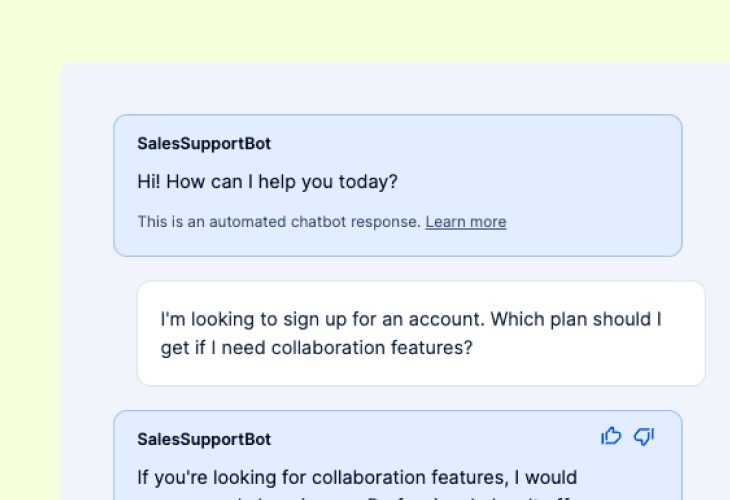
via Zapier
Zapier is an AI-driven automation tool that connects apps and workflows to automate repetitive tasks and streamline business operations.
Pros:
- Simplifies automation of time-intensive tasks.
- Integrates with a wide range of apps and services.
- Scalable for businesses of all sizes, from startups to enterprises.
Cons:
- Free plan has limitations on the number of tasks.
- Advanced features and integrations require subscription to paid plans.
C) AI Tools for Content Marketing
11. Copy.ai
 via Copy.ai
via Copy.ai
Copy.ai is an AI-powered content creation tool designed for marketers to generate high-quality written content efficiently. It offers a user-friendly interface with advanced AI algorithms for grammatically accurate and stylistically suitable content creation. The tool includes templates, prompts, and real-time feedback for optimizing content effectiveness.
Pros:
- User-friendly interface suitable for beginners and professionals.
- Wide range of content generation capabilities for various marketing needs.
Cons:
- Content generation may sometimes lag.
- Requires occasional fact-checking to ensure accuracy.
12. WriteSonic
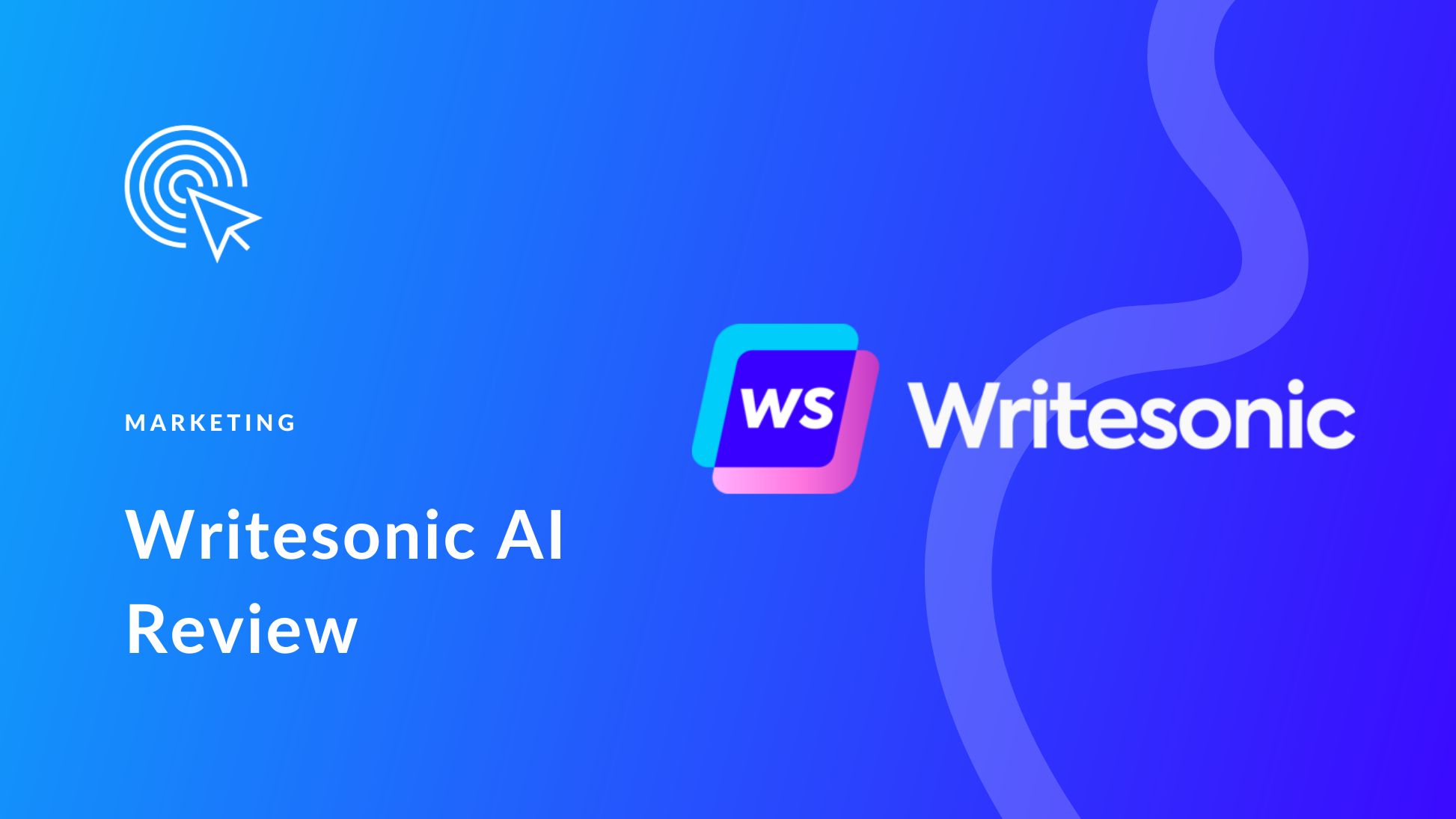
via WriteSonic
WriteSonic is a generative AI tool focused on marketing content creation, featuring capabilities like converting passive voice to active and generating analogies. It provides an extensive template library and access to video tutorials for enhanced usability.
Pros:
- Extensive template library catering to diverse content needs.
- Free version available with a generous monthly word limit.
Cons:
- Content errors may require manual correction.
- No group account access, limiting collaborative features.
13. Frase

via Frase
Frase is an AI-powered content marketing tool that helps in creating SEO-focused content. It generates content briefs, optimizes content for SEO, and provides insights into user intent and competitor analysis to improve content strategy.
Pros:
- Helps in creating SEO-friendly content and optimizing existing content.
- Provides content briefs based on user queries and competitor analysis.
- Integrates with various CMS platforms for seamless content publishing.
Cons:
- Advanced features may require higher-tier subscriptions.
- Initial learning curve for new users unfamiliar with SEO tools.
14. Clearscope
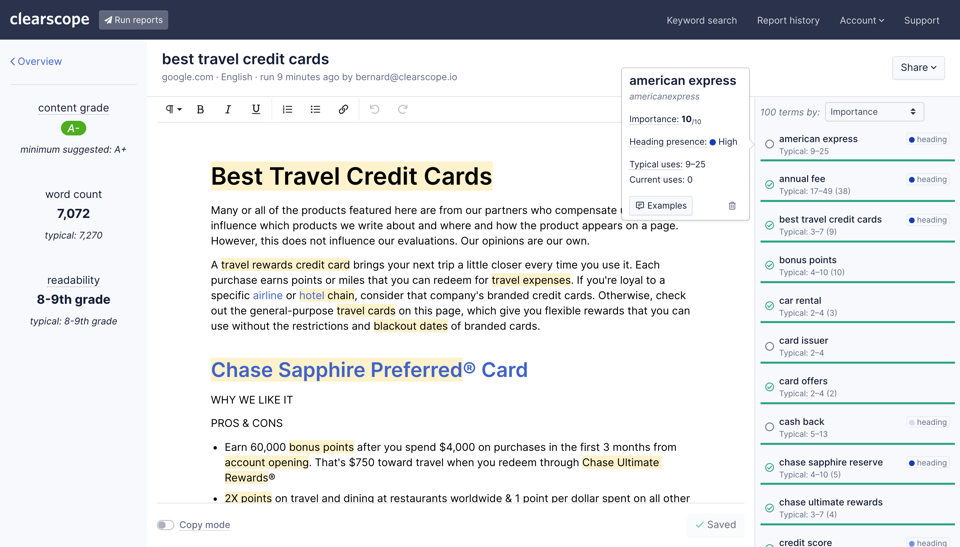
via Clearscope
Clearscope is an AI-powered content optimization platform that helps marketers create content that ranks well in search engines. It analyzes top-performing content for targeted keywords and provides recommendations to improve content relevance and SEO effectiveness.
Pros:
- Analyzes top-ranking content to optimize for SEO.
- Provides keyword recommendations and content scoring.
- Helps in improving content readability and engagement.
Cons:
- Pricing may be higher for smaller businesses.
- Requires integration with existing content management systems.
15. MarketMuse

via MarketMuse
MarketMuse is an AI-driven content intelligence platform that helps marketers plan, optimize, and create content. It uses AI to analyze content performance, identify gaps, and provide recommendations for improving content quality and SEO.
Pros:
- Offers comprehensive content planning and optimization features.
- Provides AI-driven content briefs and competitive analysis.
- Helps in optimizing content strategy based on data-driven insights.
Cons:
- Higher pricing tiers for full access to advanced features.
- Initial setup and learning curve for new users.
D) AI Tools for Advertising
16. Albert.ai
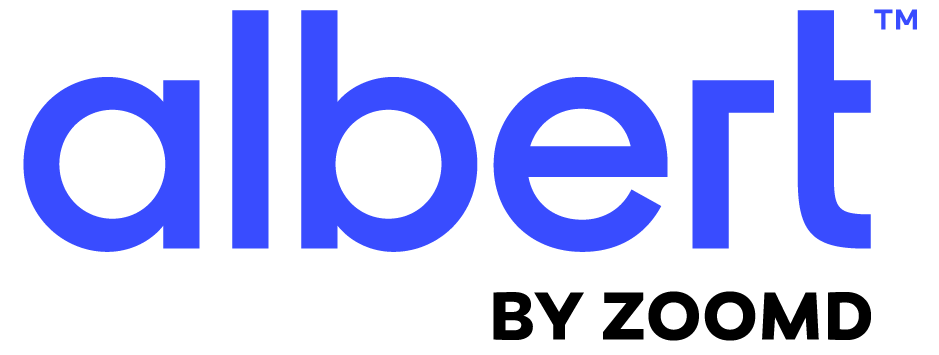
via Albert.ai
Albert.ai is an AI-driven marketing platform that leverages machine learning to autonomously manage digital marketing campaigns across channels. It optimizes advertising performance in real-time, targeting audiences and adjusting strategies to maximize ROI.
Pros:
- Autonomous campaign management and optimization.
- Real-time performance tracking and adjustment.
- Cross-channel advertising capabilities.
Cons:
- High cost associated with enterprise-level features.
- Requires initial setup and training for effective use.
17. Pattern89

via Pattern89
Pattern89 uses AI to predict ad performance across digital channels. It analyzes historical data to forecast which creatives, copy, and targeting strategies will yield the best results, optimizing campaigns for improved ROI.
Pros:
- Predicts ad performance based on AI-driven insights.
- Improves ad creative and targeting effectiveness.
- Offers real-time recommendations for campaign optimization.
Cons:
- Pricing may be prohibitive for smaller advertisers.
- Initial setup and integration with existing platforms required.
18. Revealbot
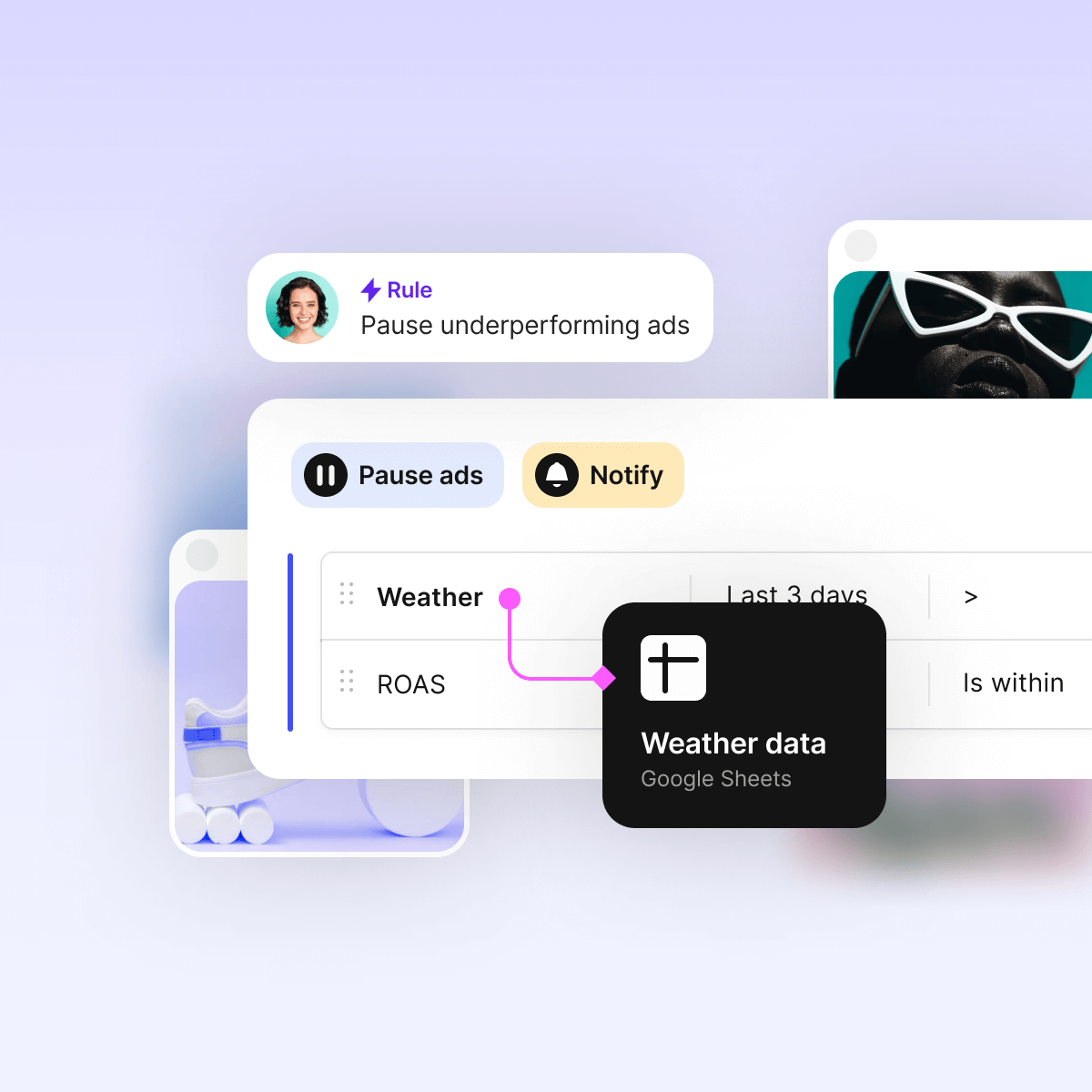
Revealbot is an AI-powered automation tool for managing and optimizing Facebook and Instagram ad campaigns. It automates budget management, ad creation, and performance monitoring, improving efficiency and ROI.
Pros:
- Automates ad campaign management and optimization.
- Provides real-time alerts and performance insights.
- Enhances ad targeting and audience segmentation.
Cons:
- Limited integration with other advertising platforms.
- Pricing structure may not suit all budget sizes.
19. Adext AI

via Adext AI
Adext AI uses AI to optimize digital advertising campaigns across Google Ads, Facebook Ads, and Instagram Ads. It automatically adjusts bids and targeting parameters to achieve maximum conversions and ROI.
Pros:
- AI-driven optimization across multiple ad platforms.
- Improves ad performance through automated bidding.
- Real-time campaign monitoring and adjustment.
Cons:
- Requires initial setup and integration with ad accounts.
- Pricing structure based on ad spend may vary.
20. Acquisio
 via Acquisio
via Acquisio
Acquisio is a platform that uses AI to manage and optimize digital advertising campaigns, focusing on Google Ads, Microsoft Advertising, and Facebook Ads. It automates bid management, budget allocation, and performance tracking.
Pros:
- Automates bid and budget management for ad campaigns.
- Enhances ad targeting and audience segmentation.
- Provides real-time performance analytics and insights.
Cons:
- Advanced features may require higher-tier subscriptions.
- Initial setup and training needed for effective use.
E) AI Tools for Market Research
21. Lexalytics
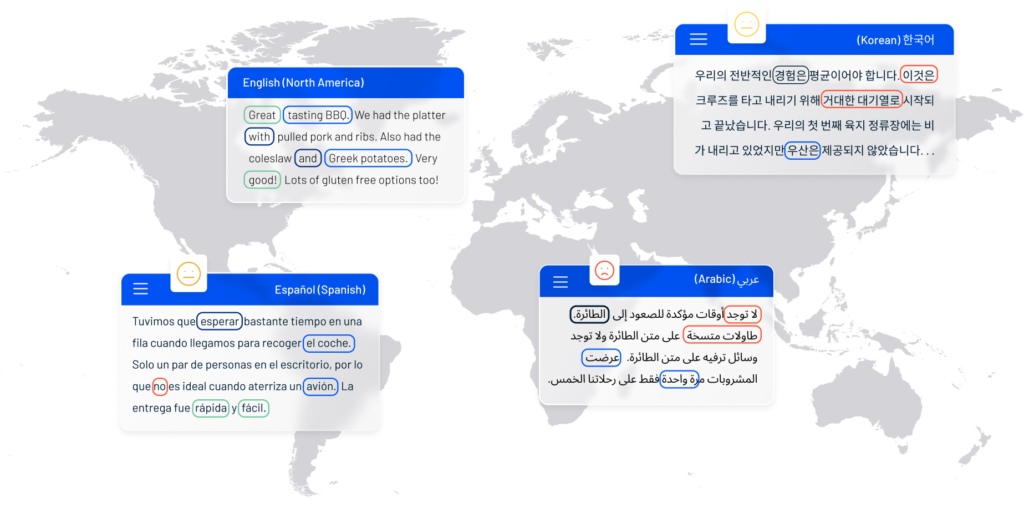
via Lexalytics
Lexalytics is an AI-powered text analytics platform that helps marketers analyze customer feedback, social media conversations, and online reviews to extract actionable insights. It uses natural language processing (NLP) to identify sentiment, topics, and trends.
Pros:
- Advanced text analytics for sentiment and trend analysis.
- Real-time monitoring of customer feedback and social media.
- API integration for seamless data integration and analysis.
Cons:
- May require technical expertise for setup and customization.
- Pricing structure may be complex based on usage and features.
22. Crimson Hexagon

via Crimson Hexagon
Crimson Hexagon, now part of Brandwatch, is an AI-driven consumer insights platform. It is using ai for marketing and machine learning to analyze social media data and consumer behavior, providing marketers with deep insights into audience preferences and sentiment.
Pros:
- AI-powered social media analytics for consumer insights.
- Visualizes data through customizable dashboards and reports.
- Identifies emerging trends and competitive analysis.
Cons:
- Pricing may be prohibitive for smaller businesses.
- Requires integration with social media platforms for data collection.
23. Zappi
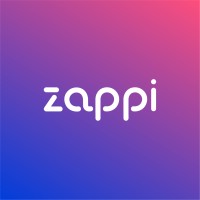
via Zappi
Zappi is an AI-driven market research platform that automates survey design, data collection, and analysis. It uses AI to predict market outcomes, test ad creatives, and optimize product launches based on consumer feedback and behavioral data.
Pros:
- Automates market research processes with AI-driven insights.
- Predicts market outcomes and consumer behavior.
- Customizable surveys and real-time data visualization.
Cons:
- Higher pricing tiers for advanced analytics and features.
- Initial setup and learning curve for new users.
24. Remesh

via Remesh
Remesh is an AI-powered platform for qualitative market research. It conducts real-time online focus groups with AI-driven moderation, analyzing large-scale conversations to uncover insights and trends in consumer opinions.
Pros:
- Conducts real-time online focus groups with AI moderation.
- Analyzes large-scale conversations for qualitative insights.
- Generates actionable insights and reports.
Cons:
- Pricing structure may not suit all budget sizes.
- Requires active participant engagement for effective sessions.
25. Pulsar

via Pulsar
Pulsar is an AI-driven audience intelligence platform that analyzes social media conversations and online content. This AI for marketing provides marketers with insights into audience behaviors, interests, and trends to inform campaign strategies and content development.
Pros:
- AI-powered audience segmentation and trend analysis.
- Tracks brand mentions and sentiment across social media.
- Visualizes data through customizable dashboards.
Cons:
- May require additional tools for comprehensive data integration.
- Pricing structure based on data volume and features.
26. SlidesAI
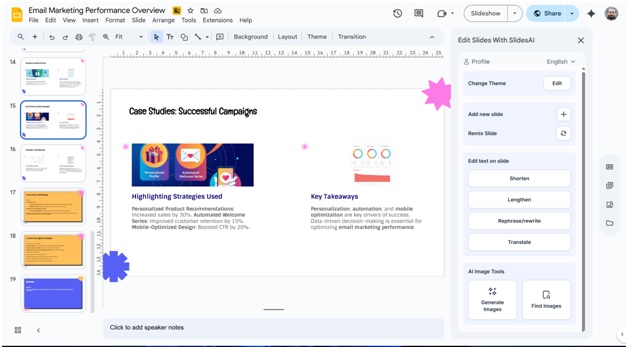
SlidesAI is an AI-powered presentation maker designed to help marketers turn campaign strategies, client reports, and content ideas into polished slides in seconds. Instead of building from scratch, you can paste raw text and SlidesAI instantly structures it into professional, presentation-ready decks. It works natively inside Google Slides and also offers a PowerPoint add-on, so teams can create, edit, and share within the tools they already use.
Pros:
- Quickly converts marketing briefs, reports, or notes into clean, branded slides.
- Works inside Google Slides and integrates with PowerPoint via add-on.
- Customizable tone options (persuasive, professional, educational) tailored for different audiences.
- Multilingual support with 100+ languages for global marketing campaigns.
Cons:
- Free plan limits the number of presentations per month.
- Some advanced features (like video export) are only on premium plans.






 via Monday.com
via Monday.com




 via Copy.ai
via Copy.ai







 via Acquisio
via Acquisio


